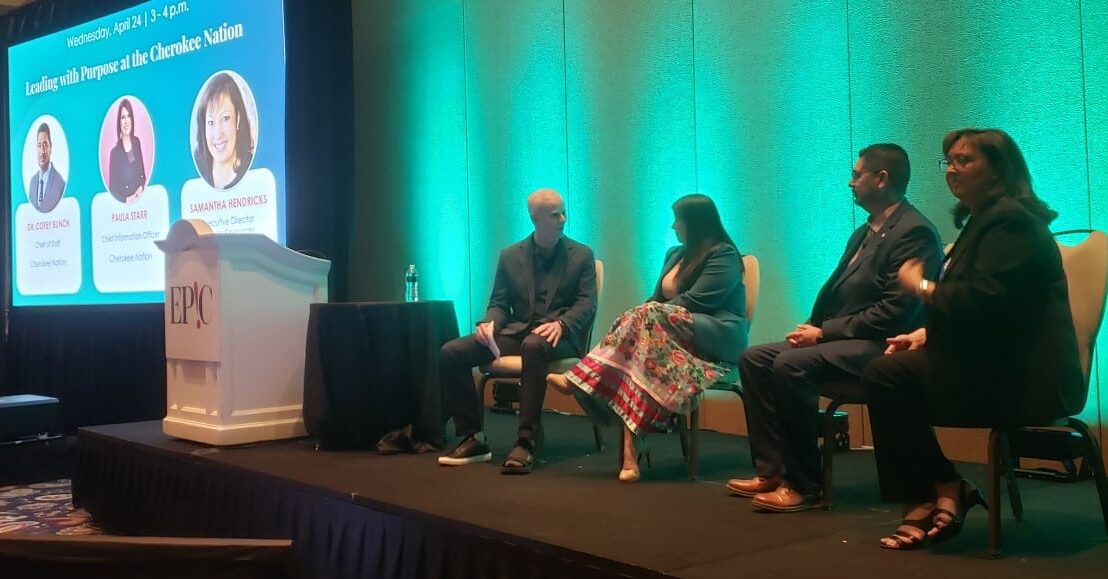Managing a workforce of thousands while shouldering responsibility for a community of nearly half a million people would be daunting for most organizations. However, executives of the Cherokee Nation are doing just that and more seamlessly—while still embracing the nation’s longstanding traditions and culture, several executives shared this week at the Elevate People, Ignite Change (EPIC) conference in Las Vegas.
As the largest Native American tribe in the U.S., the self-governing Cherokee Nation has 467,000 citizens worldwide. It employs over 15,000 people, of which about 80% are Cherokee citizens, panelist Chief of Staff Corey Bunch told the audience during the session Leading with Purpose at the Cherokee Nation.
Those 15,000 employees work across the nation’s 45 companies within Cherokee Nation Businesses, including Cherokee Federal, Cherokee Nation Entertainment and the Cherokee Nation government.
Forbes recently named the Cherokee Nation as a Top 10 employer in Oklahoma, where the nation is based, recognizing several initiatives and efforts to improve the employee experience, culture and benefits for its workforce.

Becoming a top employer
When panelist Samantha Hendricks joined Cherokee Nation as executive director of HR in 2021, she found a lot of “low-hanging fruit” that she and the executive team immediately focused on picking off for improvement.

For example, the organization’s salary schedule had not been adjusted since 2014. Hendricks conducted a market study that found that more than 80% of the nation’s government and healthcare employees needed a pay boost. The nation responded by spending $10.6 million to bring its employees’ salaries to the market rate, and it now reviews its standing annually to ensure wages are competitive.
In recent years, Cherokee Nation also increased its minimum wage and expanded bereavement leave to include employees’ uncles, who play a vital role in Cherokee culture. In addition, Hendricks bolstered the organization’s benefits offerings, adding flex spending for healthcare and childcare, focusing on mental wellness and boosting family leave benefits.
Employee savings options were also expanded as part of a Seventh Generation philosophy to boost the financial wellbeing of the nation’s multi-generational workforce and help them secure the financial future of those yet to come.
Cherokee Nation now also publishes job openings in English and Cherokee as part of an effort to increase the number of its citizens and employees fluent in the language, Bunch says. Fewer than 2,000 people speak Cherokee as their first language today, down from about 20,000 a decade ago.
The organization is also working to reduce the digital divide between its citizens and employees, according to panelist Paula Starr, chief information officer for Cherokee Nation.

“We are making sure our coworkers have the digital tools they need to do their work and [that they have] use of the cloud,” Starr says. “We have to make sure our people are comfortable with the tools.”
Employees, along with all Cherokee citizens, also have access to the Gadugi Portal, an online engagement and connection platform for the nation. The portal earned the Cherokee Nation the 2024 Smart Cities Award for civic engagement from IDC Government Insights, the first for a tribe.
Hendricks also spurred a digital transformation within the HR department.
“When I joined, we were all using paper. People didn’t know about video conferencing or chat,” she says, adding that employees now enjoy the immediacy of reaching colleagues through messaging.
And when it comes to culture, the Cherokee Nation is in a unique position.
“What makes the Cherokee Nation different from private sector corporations is it’s a sovereign nation,” says Hendricks, who previously worked in the private sector. “With corporations, employees come to work to get a paycheck.
“Here, employees are living the Cherokee life every day. It’s not just a job for them. It is a lifestyle. In HR, we don’t only care about the employee; we wonder what their family life is like and what is going on with their family. We are all connected as Cherokees. That is the difference.”
The post How the Cherokee Nation became a Top 10 employer in Oklahoma appeared first on HR Executive.